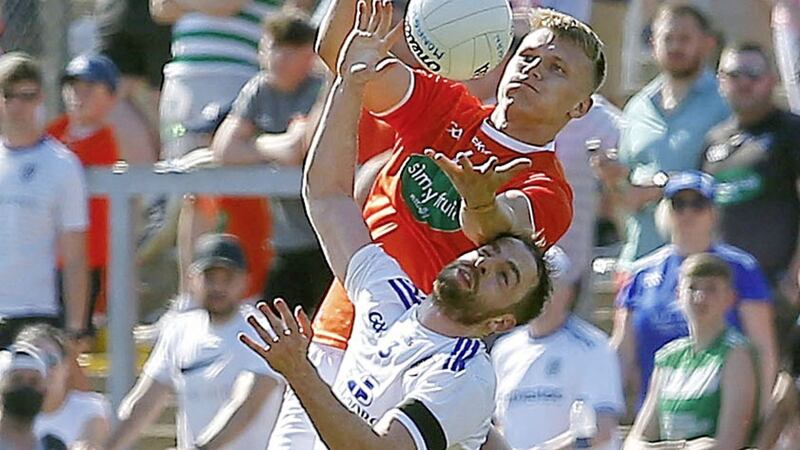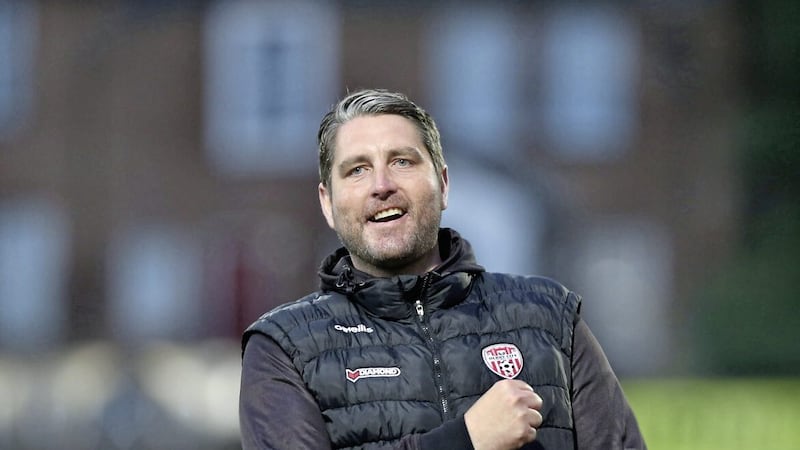BEFORE the pandemic we probably took aspects of this profession for granted. Every week we were posted to the biggest games around the north with GAA grounds thronged with supporters.
In fairness, a lot of games looked and felt the same.
Hand pass. Recycle. Hand pass. Recycle. Lateral kick pass. Recycle. It was all about playing the percentages.
A game of football would eventually break out in the last quarter.
With no crowds over the last year, the game was stripped back to the bone. All you could hear at GAA matches was the sound of paper cups bouncing along empty rows of empty stands.
It was grim.
Then you turn up on a sun-crisp day at Pairc Esler and your faith in the game is completely restored.
In previous weeks, I covered Championship matches: Armagh versus Antrim and Tyrone versus Cavan. While there were enjoyable aspects to both games – no less Darren McCurry’s marvellous performance at a sun-drenched Omagh and Antrim’s wily execution of their game-plan – it still left you yearning for the club scene.
What you wouldn’t do to be on the sideline watching Kilcoo versus Clonduff, or St Gall’s versus Cargin, or Dunloy versus Cushendall hurlers, or Dungannon Clarkes against, well, anybody really.
For all the negative, painfully one-sided reports we’ve written and readers have endured, they all seemed worth it following last Saturday’s classic encounter between Ulster semi-finalists Monaghan and Armagh.
It just shows how easily pleased we can be where one thrilling 70 minutes can airbrush virtually everything else in our midst.
GAA reporters I know are deeply invested in the game. Nobody wants to be writing one-sided reports or complaining all the time about flawed structures and whether there is anything better out there than the provincial Championships.
We all want to watch and write about games like last weekend – Monaghan versus Armagh and Tyrone versus Donegal.
Last week’s first semi-final was the kind that just blew you away.
Set against the unfathomably sad backdrop of the tragic death of Monaghan U20 captain and future senior star Brendan Og Duffy, the Armagh and Monaghan tie was exhilarating.
Some incredible football matches stand out over the years.
The 2002 All-Ireland semi-final between Armagh versus Dublin.
The 2005 Ulster final between Armagh and Tyrone; the '05 All-Ireland final between Tyrone and Kerry.
The individual brilliance that was on display in the 2008 All-Ireland quarter-final between Galway and Kerry ranks high.
The 2013 All-Ireland semi between the Dubs and Kerry and almost any time James Horan’s Mayo team took to the field in the latter stages of the All-Ireland.
And every single day Ciaran McDonald turned Croke Park into his personal canvas.
For me, though, top of that illustrious pile sat the 2011 All-Ireland quarter-final clash at Croke Park between Kildare and Donegal that was decided by the famous left boot of Kevin Cassidy in extra-time and will also be fondly remembered for the awesome display of Kildare midfielder Daryl Flynn.
But the events of Saturday afternoon in Newry eclipsed everything. If the game was rated by emotion alone, what Monaghan and Armagh threw up was the best 70 minutes I've reported on or watched.
Great games come in different guises.
When Monaghan rippled Armagh’s net in the second, 10th, 15th and 26th minutes, each three-pointer should really have been a nail in the Orchard’s coffin.
What made it a great encounter was the fact that every time Monaghan scored you never felt Armagh were out of the game.
It’s what we’ve come to expect from Kieran McGeeney’s Armagh team: they give the opposition a head start before they battle back to scorch them by sheer force of will.
As a group of players, it is some gift to have.
So, head starts and comebacks are often key ingredients of great games. Great players doing great things helps too.
For instance, some of the things Rian O’Neill did in Pairc Esler last Saturday afternoon will live long in the memory.
His catch and kick into Conor Turbitt for Armagh’s first goal is the kind of peerless moment you remember and will find a permanent place on Ulster’s archive reel.
The most joyous aspect of Rian O’Neill as a footballer is the absolute conviction he plays the game with.
The kind of mind-set the Crossmaglen man possesses is completely uncoachable.
What’s also uncoachable is the ceaseless pursuit of an opponent just to get a hand or an arm in.
Rory Grugan’s tracking back and tackling were exemplary as was Andrew Murnin’s incredible two-handed block on Monaghan substitute Stephen O’Hanlon as he aimed to shoot when Armagh led by a point.
"You can’t make a man block," McGeeney observed afterwards. "You just can’t give it to a man."
In great games, players bare their souls.
For more than a decade, no-one has bared their soul quite like Conor McManus.
A man who is crippled by hip pain for days after a game, it’s doubtful there’s ever been a better big-game player than the modest Clontibret man.
When Monaghan needed inspiration or a score to pull the game out of fire few have done it as regularly as McManus.
His standards are so scandalously high that we’ve come to expect great moments from him every time he plays – even though he’s firmly in the twilight of his inter-county career.
Last Saturday afternoon was one of those days where you wanted to throw the notebook and laptop away, forget about the passages of play, successful kick-out counts and the rest and live the game how it was meant to be lived. In the moment.
While Gaelic football has become ever more sophisticated, with the aesthetics of the game sometimes suffering as a result, Monaghan-Armagh was another stunning reminder of the infinite possibilities of the game and how it always needs great individual talents who never allowed their worldview to change between playing in their back garden and embracing the Championship stage.








